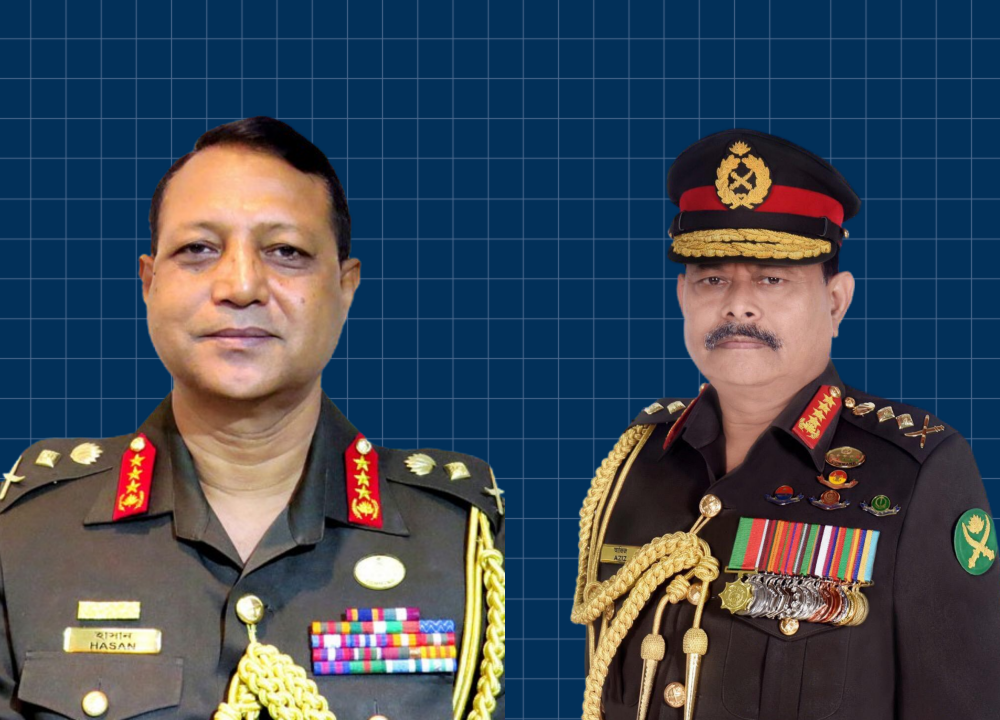General Sarwardy’s interview refocuses attention on the appointment of General Aziz Ahmed as army chief
The Bangladesh government is likely to brand the retired military officer a criminal and traitor.

As this is written, there are reports that RAB-1 has been ordered to detain Lieutenant General (retired) Chowdhury Hasan Sarwardy — who on Tuesday (July 14th) criticised the government and disparaged General Aziz Ahmed, the Chief of Army Staff (COAS) in a Facebook Live interview. As Netra News earlier reported in its Medium blog, Sarwardy is now in hiding and is seeking assistance from the international community.
If the retired general is detained, it will be interesting to see whether this will result in either a secret detention/disappearance (with the state agencies denying they have picked him up at all) or a formal arrest, presumably with a case filed under the Digital Security Act (DSA), following which he will be brought to court. The DSA’s offences are so broad that almost any criticism of the government could come within them.
It will be difficult now, however, for the authorities to secretly detain Sarwardy. Apart from the absurdity of the state denials of their responsibility if he did suddenly go “missing” when it is well known now that they are trying to arrest him, one would imagine that diplomats in Bangladesh would at the very least have cautioned the government not to do so.
Whatever the authorities decide to do with Sarwardy we can be sure the government will dust off its playbook which it uses in such situations. He will be accused by officials, pro-Awami League media, fake websites controlled by their intelligence agencies, of false allegations and conspiracies designed to brand him a criminal and unworthy of any public sympathy. The authorities can’t allow the military officer to be seen as simply a citizen who was just speaking his mind.
However, although the scenario which Sarwardy finds himself does fall within the standard narrative of how the Bangladesh government seeks to punish citizens who seek to criticise it, there is more to this case than just that.
First, Sarwardy was an army officer, and a very senior one at that. He was a lieutenant general and was tipped by many as a serious contender to replace General Belal Shafiul Huq as the Chief of Army Staff in 2018. However, that was not to be, and General Aziz Ahmed was appointed. There is no precedent in Bangladesh for a retired senior officer of such seniority to speak out so critically of the government and the chief of army staff — and so soon after his retirement.
Second, Sarwardy’s interview brought a renewed focus on the prime minister’s appointment of General Aziz to be Chief of Staff in the first place — when he has three brothers convicted of a political murder in 2004. Not only that , but two of the brothers, Anis Ahmed and Haris Ahmed, are still absconding, and the third brother, Tofael Ahmed Joseph, who was imprisoned for the crime, received a presidential pardon just a month before General Aziz was appointed Chief of Army Staff. While General Aziz should not necessarily be held responsible for the sins of his brothers, it is very odd that the prime minister would ever choose a person to be Chief of Army Staff (COAS) with such a family background. Has Aziz ever been asked about the location of his two absconding brothers for example?
At the time of Joseph’s pardon in 2019, when his brother General Aziz had not yet been appointed Chief of Army Staff, there were some news articles in the media connecting the general with Joseph. But since Aziz’s appointment as COAS, nothing at all has been written in the media about this connection.
This makes Sarwardy’s comment about General Aziz’s brothers in the interview all the more significant. He said something that COAS and the military have been keen to keep as quiet as possible. Significantly, during the interview he told a story that the military would be very keen to keep under wraps — how Joseph, since his pardon, is now being treated as a VIP who receives security escort, presumably simply because he is the brother of General Aziz Ahmed.
Thirdly, there is a global politics aspect to this drama. One of the clefts within the Bangladesh military is between officers who favour India and others who favour China. In the short-hand of Bangladesh politics, General Aziz is talked about as a pro-India person, and Sarwardy is seen as pro-China. The Awami League’s positive relationship with the Indian government has until now been crucial to its political survival, but the current serious diplomatic tensions existing between India and China has put this relationship very much under strain.
Sarwardy’s serious criticisms of India in the Facebook interview — claiming for example that important appointments in Bangladesh, including those involved “in the intelligence agencies, Chief of Army staff appointments, transfers of secretaries etc.” get “manipulated” by Indian intelligence — therefore take on greater significance at this time. In all likelihood Sarwardy’s decision to do the interview was a personal one, motivated in part by grievances he has about how he has been treated since retiring from the army (which he talks about in the interview), but there are no doubt people within the government who will see his interview as part of a pro-China conspiracy. While this is pretty far-fetched, some people will believe it while others will deliberately use it to tarnish the motive for the interview, making the implications of the interview more sensitive for the Bangladesh government.●
David Bergman (@TheDavidBergman) — a journalist based in Britain — is Editor, English of Netra News.
🔗Netra News Blog: Retired Lieutenant General in hiding after criticising army chief and government on Facebook live interview
🔗Netra News: Digital Security Act: What is wrong with the FIR against the Facebook-11
🔗New Age: Top criminal Joseph released on clemency